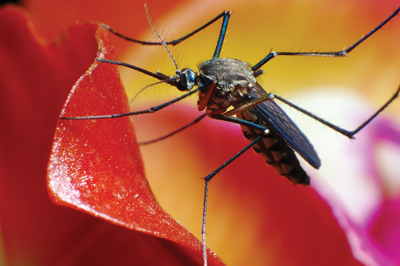
Water features provide a peaceful focal point for home owners, and the sounds of trickling, bubbling, or cascading seem to sooth the soul. For garden centres, water features represent a trend that can generate increased traffic and considerable profits.

|
Water features provide a peaceful focal point for home owners, and the sounds of trickling, bubbling, or cascading seem to sooth the soul. For garden centres, water features represent a trend that can generate increased traffic and considerable profits.
Unfortunately, the increased threat of West Nile virus in parts of Canada, along with public misconceptions and over-reacting media reports, have combined to fuel fires of fear and paranoia. There are a lot of inaccurate reports about the dangers of standing water, a particular concern to homeowners who enjoy aquatic gardening, and as a consequence some garden centres are reporting a decrease in the sale of water gardens and related product lines.
A greater comprehension of West Nile virus, and the habits and life cycle of mosquitoes will ease unfounded fears, help protect customers in cases where there is a legitimate threat of West Nile, and encourage renewed interest in water features. The vital thing is to educate staff so they can in turn inform patrons.
Infection from West Nile virus is caused by a mosquito-borne virus, which, if contracted, can be serious because at this time there is no specific vaccine. Only a tiny fraction of mosquitoes carry the virus, and according to Health Canada most people who have been infected will have no symptoms. Some, approximately 20 per cent, will develop mild flu-like symptoms including fever, headache and muscle aches that last a week or less. In less than one per cent of cases the infection is life threatening.
In other words, the actual threat of contracting the illness is miniscule. That’s important for people to understand. “Mosquito larvae live in shallow, still water. Nevertheless, they are not water breathers and must extract oxygen from the air, which they do via a small breathing tube on their posterior end,” explains Chris Dahl, owner of Hydrosphere Water Gardens and Fishery, located in Bradford, Ont. “In still waters the larvae can, with effort, push their tube through the surface to breath. Moving water makes it almost impossible for them to breath, due to the surface tension. As a result, larvae will drown in short order.”
Mosquitoes will not, therefore, lay their eggs in any water that experiences constant movement. The amount of movement required to make water uninhabitable to larvae is almost negligible. Almost any backyard water feature with a fountain, spitter, waterfall, or even just a pump to circulate water, will be avoided by mosquitoes as a breeding ground and is therefore perfectly safe.
“Another alternative, if the water feature is large enough, is to add a few fish,” continues Dahl. “Fish will eat the larva, as well as the mosquitoes as they lay their eggs. The best variety is goldfish, since they eat a lot and will reproduce rapidly. Don’t feed the fish, however, as it will deter them from feeding naturally.”
Unfortunately, it’s not just ponds and fountains that become fertile breeding ground for mosquitoes if left untended. Any source of standing water can be a problem. Rain barrels are probably the most attractive mosquito breeding grounds typically found in a garden. The water is stagnant and still, it’s rich in the nutrients upon which larvae feed, and there are no natural predators residing within the water to prey upon them. As a result, barrel tops should be covered with a very fine mesh that will keep out debris and, more importantly, mosquitoes. If your barrel doesn’t have this, it should be easy enough to fashion such a lid on your own. It’s hard to overstate how important this is; rain barrels are essentially petri dishes for West Nile virus.
Birdbaths can be a danger if the water is allowed to sit for extended periods, and to alleviate this problem, water should be changed weekly. Finally, any other stagnant water in the yard, such as ditches or containers in which unnecessary water accumulates, should be drained as soon as possible.
“If you have any doubts about the safety of a pond or water feature, use chemical products,” advises Rowena Burns, one of the owners of Burns Water Gardens and treasurer for the International Waterlily & Water Garden Society. “One of the best products on the market is a new one called Mosquito Dunks, which look like hockey pucks and are submerged in the water. They have an indefinite shelf life, are cheap ($20 for six), and a single dunk treats 10 square feet for 30 days.” There are also a variety of other larvicides and adulticides available on the market, inclu-ding Aquabac, a highly selective microbial insecticide that kills mosquito eggs.
The above measures will allow customers to feel safe in the knowledge that they’ve protected themselves and their families from West Nile virus. Perhaps as importantly, armed with a greater understanding of the disease and its carriers, customers should recognize that the threat of West Nile is overstated.
“The risk of mosquitoes and West Nile virus is extremely minimal in ponds of water features that are properly tended, with water movement or fish,” stresses Burns. “Thankfully, as people are educated they realize there’s really nothing to fear and that they can still enjoy water in their gardens.” That’s the message that you as garden centres have to reinforce.
|
||||||||||||||||||||||||||||||||||
Print this page